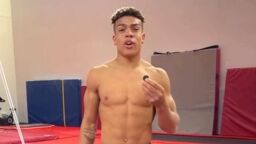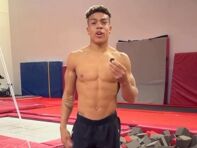Denis Vachon didn’t waste any time telling his team of young gymnasts to respect a transitioning teammate.
And they wasted no time embracing her.
In an essay for the Canadian Broadcasting Company, Vachon shares his experience coaching Emily, who started transitioning when she was 12 years old.
When Vachon first met Emily, they called her a boy’s name, and that boy was timid and reserved. But when E (her nickname until she settled on Emily) started to show up to practice, the change was instantaneous. She was confident, vibrant and joyful. Vachon says it was like bringing aboard an entirely new athlete.
E’s physical changes happened more slowly, but over time, her hair started to grow longer, and she began dressing more effeminately. One day, she came to practice with her nails painted and hair in a short ponytail. Her teammates’ eyes started to wander.
When E excused herself to use the restroom, Vachon made it clear discrimination wouldn’t stand in his gym.
“When E asked to go to the restroom, I took the opportunity to pull the remaining group together and tell them that I had noticed their looks, their body language and changed behavior, and that it wouldn’t work in our gym,” he writes. “I reminded them that we all came to tumbling because of our common love of the sport, and to let our differences fall away.”
As an openly gay man, Vachon says he’s always found solace in the gymnasium. He’s coached gymnastics for almost 20 years in Canada, and taken teams to the World Championships.
But in order to find solace, one must be supported. Vachon says the teenagers on his team, most of whom were boys, didn’t treat E any differently.
“Kids really can be better than adults,” he writes. “They have the capacity to be open-minded, encouraging and willing to grow. It’s mind-blowing to me, how a group of teenagers, most of whom were boys, embraced E for her bright qualities.”
Eventually, Emily’s body could no longer handle the physical toll of gymnastics, and she became a successful trampoline athlete in high school. Vachon says she made it to the highest provincial category and almost made the national team.
Today, Emily and Vachon stay in touch over social media. He says the reaction to his essay has been “heartwarming.”
“Everyone is just happy that Emily had a strong support system in her life,” he told Outsports.
Most of all, Vachon says he’ll never forget coaching her.
“My world is a better place because of her,” he writes.
If you’re an LGBTQ person in sports looking to connect with others in the community, head over to GO! Space to meet and interact with other LGBTQ athletes, or to Equality Coaching Alliance to find other coaches, administrators and other non-athletes in sports.







































